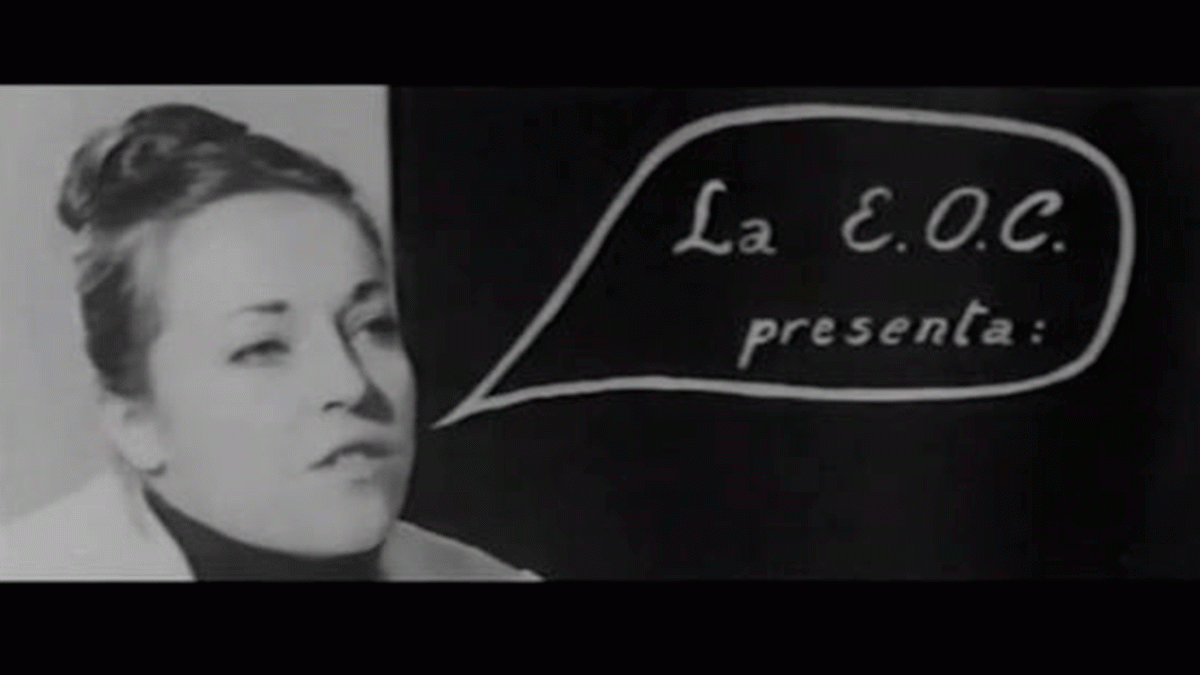Film and Music
Cecilia Bartolomé
Margarita y el lobo (Margarita and the Wolf) is a medium-length film made in 1969 by Cecilia Bartolomé as a final project in her Film Directing degree at the Official School of Cinematography in Madrid. Along with Carmen de Carabanchel (Carmen from Carabanchel) — a short film produced four years previously, also as part of her studies at the same School – it can be considered the first feminist film in the history of Spanish cinema. Based on the novel Les Stances à Sophie (1963), by French feminist Christiane Rochefort, Margarita y el lobo is a musical in which Bartolomé tells the story of a young middle-class woman who, after falling in love and marrying a boy from high society, separates to live an independent life.
The film is structured into five chapters, and in each one the director introduces a theme to deconstruct the standard life model of women as “angel of the home” and to execute a critique, devastating and hilarious in equal measure, of the system and its most emblematic institutions, such as Justice, University and the Catholic Church. The obligation to be happy, marriage as the only option for women in life, adultery, lesbianism, and prostitution accompany a track from a different musical genre for each case, including bossa nova, The Beatles’ pop music and a sung version of the Creed. The film was censored, as was the artistic practice of the artist, which meant almost ten years would pass before she was able to shoot her first feature-length film Vámonos, Bárbara (Let’s Go, Bárbara, 1978), a chant for women’s freedom.
The Films from that Era
Las Conversaciones de Salamanca (The Salamanca Conversations), held from 14 to 19 May 1955, brought together cinema critics and professionals from divergent ideological spheres, facilitating intellectual debate around the aesthetic and social role of film. In line with the new wave cinema surfacing across Europe, it set forth the need to create high-grade cinema with a national character that would reflect the situation facing Spanish citizens and their reality.
Pivotal titles from New Spanish Cinema are Calle Mayor (Main Street, 1956) by Juan Antonio Bardem, Miguel Picazo’s La tía Tula (Aunt Tula, 1964) and Nueve cartas a Berta (Nine Letters to Berta, 1966) by Basilio Martín Patino, films in which, starting from realist considerations, depict stifling family environments and domestic spaces where repression impedes normal relationships. In these stories, oppressive living conditions for women are front and centre and take on a symbolic quality.
Almost exact opposites are Rafael Salviá’s Las chicas de la Cruz Roja (Red Cross Girls, 1958) and La gran familia (The Big Family, 1962) by Fernando Palacios, both falling within the light-hearted comedy genre, the españolada (stereotypically Spanish) inherited from the sainete (Spanish comic sketch), displaying the stereotype and fixity of social classes under an umbrella of happiness and joy before the scarcity of material resources. The option of marriage and family appear as the only possible paths in the organisation of a woman’s life, and in these titles the female characters represent a moralising and exemplary role, avowing women’s place in society.
The Music from that Era
At the end of the 1960s in Spain, opposite music promoted by Francoism (traditional Castile folk, Andalusian flamenco, zarzuela), the protest song began to make its presence felt. The demand for rights and freedom against the repression of the regime was also expressed through music bearing a strong relation to social change and used as a way of making the country’s different cultural identities silenced by the dictatorship visible. As with artists, women singers and singer-songwriters confronted the official culture of Francoism, demonstrating their commitment to promoting change and bringing to light feminist aspirations.
A compilation of songs by Vainica Doble, Maria del Mar Bonet, Cecilia, Pepa Flores (Marisol), Rosa León and Marina Rossell can be heard on RRS Museo Reina Sofía Radio.
Songs
- María del Mar Bonet. Qué volent aquesta gent, Concentric (1968)
- Rosa León. La secretaria ideal, EMI (The Ideal Secretary, 1973)
- Marisol. Comprada, Zafiro (Bought, 1979)
- Rosa León. La soltera, EMI (The Unmarried Woman, 1973)
- Rosa León. El reino del revés, EMI (The Kingdom of Misfortune, 1974)
- María del Mar Bonet. M'en aniré de casa, Concentric (1968)
- Vainica Doble. La cocinita mágica, Guimbarda (The Magic Kitchenette, 1980)
- Rosa León. Canción consumo, EMI (Consumption Song, 1973)
- Marisol. Amor verdadero, Zafiro (True Love, 1969)
- Vainica Doble. Madre no hay más que una, Guimbarda (There Is Only One Mother, 1981)
- Nuestro Pequeño Mundo. Me casó mi madre, Movieplay (My Mother Married Me Off, 1968)
- Vainica Doble. El rey de la casa, Guimbarda (King of the House, 1981)
- Rosa León. Canción de cuna para un gobernante, Ariola (Lullaby for a Governor, 1975)
- Marisol. Duerma usted tranquila, madre, Zafiro (Sleep Soundly, Mother 1979)
- Rosa León. Los fantasmas, EMI (The Ghosts, 1973)
- Vainica Doble. Coplas del iconoclasta enamorado, Ariola (Coplas of the Iconoclast in Love, 1973)
- Cecilia. Un ramito de violetas, CBS (A Bouquet of Violets, 1975)
- Vainica Doble. Habanera del primer amor, Ariola (Habanera of the First Love, 1973)
- Rosa León. Viva el beat, el rock, el pop, el soul, y lo demás, EMI (Long Live Beat Music, Rock, Pop, Soul and the Rest, 1973)
- Marina Rossell. Sóc una dona, CBS (1980)
- Vainica Doble. Déjame vivir con alegría, Movieplay (Let Me Live with Joy, 1976)
- Rosa León. La vaca estudiosa, EMI (The Studious Cow, 1974)
- Cecilia. Mi querida España, CBS (My Dear Spain, 1975)











